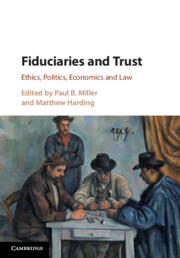Book contents
- Fiduciaries and Trust
- Fiduciaries and Trust
- Copyright page
- Dedication
- Contents
- Contributors
- Acknowledgements
- Introduction
- Part I Personal Trust and Fiduciary Relationships
- 1 Fiduciary Grounds and Reasons
- 2 Trust and Advice
- 3 Contracts, Fiduciary Relationships and Trust
- 4 Trust, Autonomy and the Fiduciary Relationship
- 5 The Psychology of Trust and Fiduciary Obligations
- Part II Personal Trust and Fiduciary Duties
- Part III Political Trust and Fiduciary Government
- Part IV Trust and Fiduciary Law in Context
- Index
3 - Contracts, Fiduciary Relationships and Trust
from Part I - Personal Trust and Fiduciary Relationships
Published online by Cambridge University Press: 13 March 2020
- Fiduciaries and Trust
- Fiduciaries and Trust
- Copyright page
- Dedication
- Contents
- Contributors
- Acknowledgements
- Introduction
- Part I Personal Trust and Fiduciary Relationships
- 1 Fiduciary Grounds and Reasons
- 2 Trust and Advice
- 3 Contracts, Fiduciary Relationships and Trust
- 4 Trust, Autonomy and the Fiduciary Relationship
- 5 The Psychology of Trust and Fiduciary Obligations
- Part II Personal Trust and Fiduciary Duties
- Part III Political Trust and Fiduciary Government
- Part IV Trust and Fiduciary Law in Context
- Index
Summary
My chapter considers the operation of trust in contracts and fiduciary relationships. Much has been written about how trust might figure in each setting, but there is little academic literature comparing the profile and workings of trust against the backdrop of the two legal forms. The gist of my argument is that contracts tend to orient and channel trust in one set of ways, and fiduciary relationships in a different set of ways. Part 2 draws a distinction between interpersonal trust and what, informed by work in sociology, I call ‘confidence’ in the predictable functioning of social or technological systems. I then argue that confidence is likely to develop differently in contracts than in fiduciary relationships, and that this has implications for how trust is likely to develop in each legal setting. In Part 3 of the paper I argue that there are reasons to think that the content of trusting beliefs might be different in fiduciary settings than in contractual settings. These reasons look to key differences between the contract form and the form of fiduciary relationships. I then explore some types of case in which contract and fiduciary forms interact in ways that might affect the content of trusting beliefs.
- Type
- Chapter
- Information
- Fiduciaries and TrustEthics, Politics, Economics and Law, pp. 55 - 73Publisher: Cambridge University PressPrint publication year: 2020

